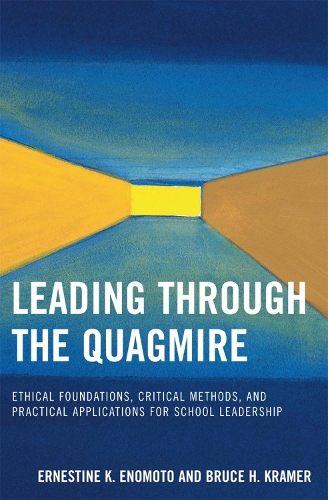
Leading Through the Quagmire: Ethical Foundations, Critical Methods, and Practical Applications for School Leadership
(Paperback)
Publishing Details
Leading Through the Quagmire: Ethical Foundations, Critical Methods, and Practical Applications for School Leadership
By (Author) Ernestine K. Enomoto
By (author) Bruce H. Kramer
Foreword by Robert J. Starratt
Bloomsbury Publishing PLC
Rowman & Littlefield Education
15th February 2007
United States
Classifications
General
Non Fiction
371.2011
Physical Properties
Paperback
176
Width 154mm, Height 231mm, Spine 15mm
263g
Description
School leaders are constantly challenged by diverse students and conflicting interests between faculty and staff. They are often called upon to make sense of ethical quagmires, where rules might conflict with desired outcomes or personal values clash with professional obligations. Negotiating these dilemmas can be challenging, but democratic ethics can offer an effective process to work through them.
Drawing from the writings of John Dewey, Leading Through the Quagmire advocates his notion that democracy is an appropriate response to the multitude of conflicting interests, needs, and values in educational settings. Moreover, Enomoto and Kramer propose an inquiry method to harness democratic ethics for engaging in fair deliberation and conflict resolution. This book provides the foundation for understanding tensions, as well as the methods and applications to navigate through them. Stories and examples are provided to enable readers to understand such terms as utilitarianism, ethical tensions, religious attitudes, and eco-feminism in meaningful ways.
Reviews
This text is well organized and should be required reading for all who lead, or aspire to lead, schools. Anyone who wants to make a positive impact on school environments will gain from reading it. Highly recommended. * Choice Reviews *
Author Bio
Ernestine K. Enomoto is an associate professor at the University of Hawaii-Manoa where she has taught since 1998. Her scholarship has focused on leadership and organizations serving multi-ethnic student populations.
Bruce H. Kramer is associate dean of the School of Education at the University of St. Thomas and the former chair of the Department of Leadership, Policy and Administration. His research interests focus on the application of critical pragmatism to the ethical judgments of leadership.
